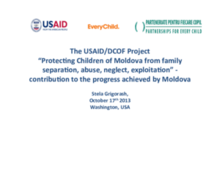On the 17th October, Dr. Stela Grigorash, a senior Moldovan child protection expert and the Director of Partnerships for EveryChild Moldova gave a presentation at the USAID/DCOF office in Washington DC, USA, on the important work and lessons learnt in reforming the care system in that country. Just over a decade ago Moldova institutionalized its children at an extremely high rate. Between 2002 and 2012 the country saw a decrease in the percentage of children in residential institutions of over 50%. As a result of the reforms so far, 18 institutions have been closed, and over 9,700 children are in family-based alternative care, the vast majority in kinship care. Dr. Grigorash gave an overview of the USAID/DCOF-funded work to support the government of Moldova in transforming the national child protection system, then discussed in depth specific approaches and methods to deinstitutionalization, reintegrating children into families, and preventing unnecessary separation of children from families.
In a first general power point presentation, Dr. Grigorash provides an overview of the institutional care situation in Moldova and explore the push and pull factors for children’s institutionalization, and the background to child care reforms in the country. She highlights the key results from those reforms and explains the approach taken by the USAID/DCOF-funded work to support the government of Moldova in transforming the national child protection system and implementing a major deinstitutionalization process, including the theory of change underlying it. She identifies key success factors but also underlines the remaining challenges and the strategy for continuing reforms.
In a second more technical power point presentation, Dr. Grigorash presents in more details the lessons learnt through the care reform process in Moldova around 8 key areas of change, including gate-keeping, the transformation of residential care, reallocation of funding, communication strategies and child participation. These presentations provide important documentation of learning in transforming the care system at the country level, which can contribute to the work of others working to reform the care system in their countries.
©Partnerships for EveryChild Moldova

